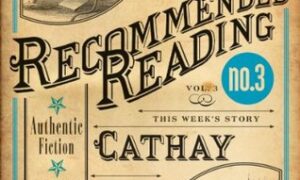 The Well by Catherine Chanter
The Well by Catherine Chanter
My rating: 3/5 cats



so, obviously, you should listen to blair before you listen to me. her glowing review is the review i wish i’d written for the reading experience i wish i’d had.
i didn’t dislike this book, but i wasn’t able to get past my frustration at the narrowness of the scope of the story. it takes place in england, on an isolated piece of property deep in the countryside known as “the well” which ruth ardingly and her husband mark purchase after fleeing a scandal in london. their plan was to start over in this new idyllic location, to see if living away from the hustle and scrutiny of the public eye would give them enough private space to save their marriage. and for a while, it was all working out.
and then the drought began.
for three years, no rain falls anywhere in britain, except at the well. as the rest of the nation dries up and panic sets in, mark and ruth again find themselves the center of attention by desperate people who want answers. reporters, government officials, and ordinary folk approach the borders of their property, treating it like some kind of new holy land. their wayward daughter angie shows up with their beloved seven-year-old grandson lucien and a caravan of travelers; a nomadic “family” formed to keep each other clean and sober, letting their children run wild and free in a sort of hippie lifestyle. besides angie and her friends, the only other people allowed onto the property are a group of nuns: the sisters of the rose of jericho, led by the charismatic sister amelia. the sisters are quick to elevate ruth to the status of a saint, and spread her words far and wide to promote their own fanatical feminist-spiritual views. amelia falls under their sway, discovering the cleansing effects of spiritual ecstasy, and leaving mark to handle the practical aspects of running a farm. this puts further strain on their already-wobbly marriage.
this is not how the novel begins. it begins in the aftermath of all of that, with ruth, alone and newly released from prison after being incarcerated for arson and the suspicious death of lucien. she is sent back to the well and placed under house arrest, monitored by armed guards and allowed the weekly visits of a priest, but otherwise completely isolated, having lost contact with both mark and angie, and with no way to get in touch with the dispersed sisters. she wanders through the rooms of her former paradise, backtracking to where it all began to go wrong, trying to piece together the events of the night lucien died; not sure whether she is guilty of his death, but needing to know if not her, who?
so my problem (and it’s really MY problem—it probably won’t bother other readers in what is a pretty solid debut novel) is that the drought element didn’t seem “real;” it seemed like an unnecessary distancing/isolating device to add another layer of conflict. i wanted to know more about the water crisis—what was happening outside of the well. i don’t need to know whether it’s science or supernatural or why the well is spared, but i did want more information about the rest of the nation. i understand this is not that story—this is the story of one woman in a personal crisis who doesn’t have access to that kind of information, but since we do get dribs and drabs of how the drought is affecting people outside of the well’s splendor, i just wanted more of those worldbuilding aspects.
while i am a fan of some books that have used apocalypse as backdrop only: Zone One, The Reapers are the Angels, etc.—this one seemed cluttered and claustrophobic; too specific to one person’s POV for me. this story could have been told without the water crisis and it would have been enough for me. it’s enough that her grandson was murdered, her husband View Spoiler »,her daughter was a junkie and she herself has fallen under the spell of a manipulative woman. but the eco-crisis is the hook for the modern reader, and would have been for me too, with more focus—if it wasn’t just running in the background the whole time.
also View Spoiler »
i did enjoy reading this. i liked the voice and the description—my problems were attached to my own personal expectations and wishes, which shouldn’t cause anyone else to stumble.
read my book reviews on goodreads







